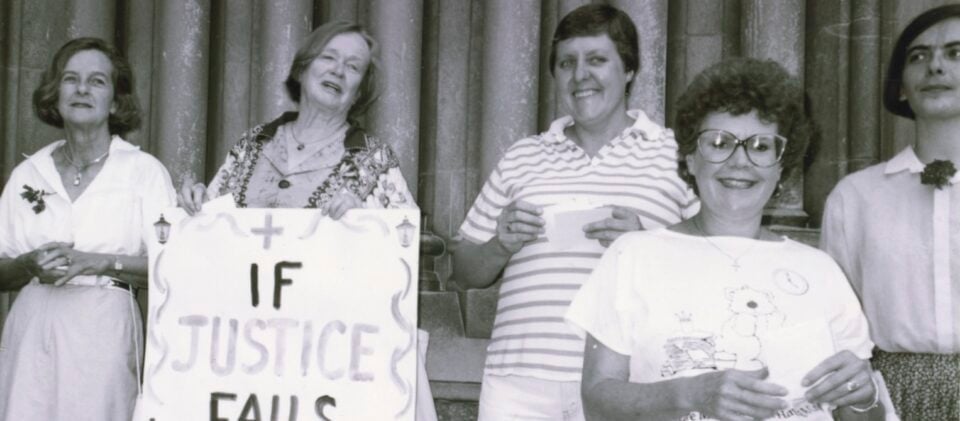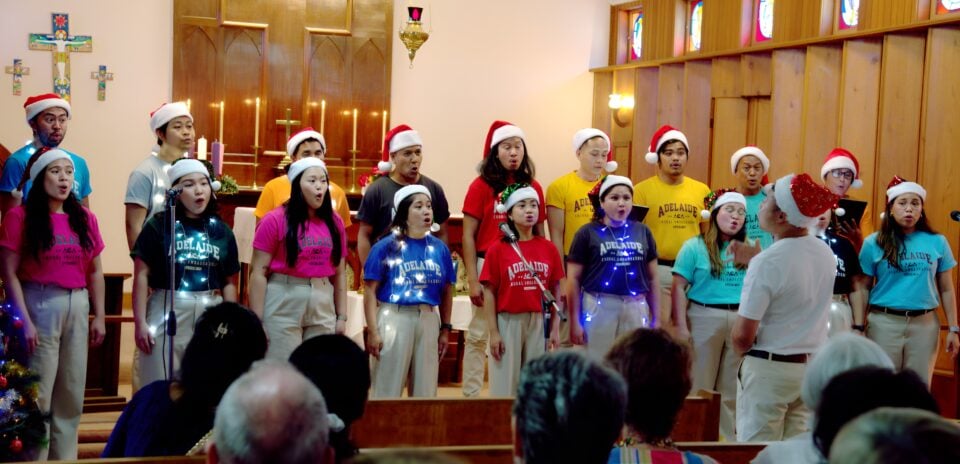By Tracy Lauersen
Australia has a domestic violence problem. We know this. We know it from the weekly news reports about domestic violence incidents. We know it from our Police Force, who report that they deal with 5,000 domestic violence calls each week – one every two minutes.
Tragically, this violence at the hands of a current or former partner, commonly called domestic violence, or more recently, Intimate Partner Violence (IPV), is also gendered, with men more likely than women to perpetrate it, and more likely to use frequent, prolonged and extreme violence.
We also know that this Intimate Partner Violence is experienced in different ways by different communities. Aboriginal and Torres Strait Islander communities report different levels of prevalence and different drivers of violence. Disabled people, and people from culturally and linguistically diverse communities report different rates and experiences of violence.
What about church communities – is violence present in the relationships of our members, and if so, is it different to the kind of intimate partner violence we read about in the papers each week?
Violence is prevalent not only in the broader community, but also in our church communities.
The Royal Commission into Family Violence reported in 2016 that faith communities were vital settings for influencing attitudes and providing leadership in relation to such violence. However, the role that our churches are able to play was limited until now by a lack of current Australian data on how women and men in church communities experience violence.
In order to understand the nature and prevalence of IPV in our church communities so that we can contribute to overcoming this widespread problem, our 2017 General Synod of the Anglican Church of Australia resolved to investigate its prevalence and nature in our own church population.[4] Following the Synod motion, our Standing Committee established the Family Violence Working Group, with one of its objectives being to undertake a research study into the nature and prevalence of family violence within the Australian Anglican Church population. That research, comprising three separate studies across two years by NCLS Research for the church has recently been completed.
Shockingly, the findings highlight that IPV is prevalent not only in the broader community, but also in our church communities. The research found that the prevalence rates of intimate partner violence affecting Anglicans were at least equal to or higher than that affecting people in the broader community. As shown in Figure 1 below, they were equal when asked about intimate partner violence in the last 12 months, and greater when asked about intimate partner violence over a lifetime.

The research also found that intimate partner violence is gendered, affecting significantly more women than men. Men were reported as more violent on every scale: physical, sexual, using harassing behaviours and spiritual abuse.
You can read the top line results of the research here.
The results are confronting and the only appropriate initial response to these results is profound grief – the grief that accompanies the realisation that even in the church, some people, particularly women, are not safe. A second response is to lament for the victims and for any negative or unhelpful role the church has played in their victimisation. And a third response is to want the church to urgently do something to prevent such violence continuing to affect our members.
As a nation, our knowledge about the social problems of family and Intimate partner violence has been growing significantly over the past twenty years. Our profound national grief over the victimisation of women particularly was highlighted by our choice of Australian of the year: domestic violence campaigner Rosie Batty in 2016.
Various international reports by the United Nations and the World Health Organisation, along with our own Australian Human rights Commission, the Office of women and reports such as the Community Safety Survey, along with the Royal Commission into Family Violence, have made Australians aware of the magnitude of this problem. Like the rest of Australia, members of the Anglican church had been becoming more aware of this social problem and also becoming worried that some of our own might be among the walking wounded of those affected by it.
The Church drafted 10 Commitments to prevent violence
Worse, that we might even be doing or not doing things as church communities that exacerbated the problem. With over three million Australians that identify as Anglicans, a problem in our society is both a concern for us and something that is likely to be true of us as well. And so we resolved to study the prevalence and nature of intimate partner violence amongst Australian Anglicans.
The report coming out of the research lists 24 top line findings. Some of those findings are good news, and many of the findings will help the church in very concrete ways to map a way forward, as we are already starting to do, with the church drafting 10 Commitments to prevent violence which encompass addressing primary drivers of violence in the church and unhealthy church cultures as well as the training of clergy and the education of our members and care for those affected.
All Dioceses are being encouraged to adopt these commitments. Some Dioceses already employ prevention programs and these findings will help Dioceses to work together on these. Some Dioceses already make provision for supporting those affected by violence and have developed policies to address both victims and perpetrators. The research underlines the vital importance of such initiatives and the critical nature of addressing gaps in our provisions. Our next Anglican synod (parliament) in 2022 will consider the allocation of resources nationally to advancing change.
In researching the particular nature of intimate partner violence in our church communities, our research found that although unintended, Christian teachings sometimes contribute to and potentially amplify situations of domestic violence. The research found that “however unintended it may be, teachings related to marriage, gender and forgiveness can be a contributing factor in the extension of the cycle of IPV and can create a situation of harm for people in abusive relationships. Absolutist discourses related to marriage as a lifelong commitment, the submission of the wife to the husband, unconditional forgiveness, and suffering for Christ – whether they are taught by church leaders, internalised by victim-survivors, or co-opted by abusers in this way – are harmful for those who experience abuse. Participants recounted feelings of self-doubt, self-blame, entrapment and shame that they directly attributed to certain discourses about intimate relationships. Conversely, discourses such as marriage as a covenant, the equality of partners in a marriage, and God’s mercy and love can help to empower victim-survivors to extricate themselves from abusive relationships.”[6]
The research also found that perpetrators of violence can misuse Christian teachings and positional power. Participants shared examples of how perpetrators made claims about Christian teachings and used their power in relation to church structures to control and extend the cycle of abuse. In some cases, participants said that their abusive partners used obligations around the sanctity of marriage, the headship of the husband, and the imperative to forgive as controlling factors.
These findings give us much insight into the nature of IPV in church communities. They help us to understand how perpetrators can abuse some of the teachings of Christianity, and they also flag for us how important it is for us to have continuing reflection on how we interpret and teach some parts of scripture, such as male headship. Male headship, also known as patriarchy, is widely accepted to have been the social context of the ancient world in which much of scripture was written rather than a prescriptive lifestyle commanded for relationships for all time.
Many in the church understand such patriarchy to be the result of the curse of sin and a relationship dynamic that the gospel overcomes, rather than a model for ideal relationships. However, male headship is still taught as a prescriptive command by some in the church. Are the social structures of the ancient near east and the Roman Empire, which we find as the backdrop of the Old and New testaments, really a prescriptive pattern for Christians? We need to reflect anew on these things and honour our value of being a church that is reformed and yet always reforming.
It is not surprising that someone who wants to exercise coercive control over another will pull a verse out of scripture such as ‘forgive as you have been forgiven’, out of context, quoting it in the same way one might quote a sentence of Shakespeare. But that is not the way to treat Scripture. In the light of the misuse of scripture by perpetrators, another challenge of the research findings is for our preachers and teachers to show how such scriptures ought to be used and to open up a space for discussion in our churches about some things we may not have thought deeply enough about.
These may include: are there limits to forgiveness? In the context of marriage, does forgiveness mean forgetting sin, or should sin such as intimate partner violence have relationship consequences despite forgiveness? Should forgiveness be automatic? Does forgiveness mean you can’t safeguard yourself, or can one forgive and still remove oneself to safety as well? Does violence break the marriage covenant?
I feel privileged to be part of a church that is willing to look at itself objectively
Isn’t any giving over of rights (as taught by the concept of submission) voluntary and mutual? What rights, human and other rights, do we have in a relationship? In Genesis 1 and 2, we find men and women mutually bear Gods image and are given a mutual calling and gifting. These are foundational texts for humanity and our relationships. Why don’t we reflect on them for marriage rather than the highly debated contextual sentences uttered by the Apostle Paul to some Christians in the early church. How did Jesus treat men and women and the vulnerable and the powerless? How did Jesus treat women such as Mary, Martha, the woman at the well, the bleeding woman? Isn’t that our model as Christians?
Broader research into intimate partner violence tells us that the causes and risk factors for it are best understood as a multi-layered interaction of individual, relationship, community and society factors. Some of these seem to have been identified in our churches research: Individual factors such as a victim’s personal acceptance of violence due to priority being given to the longevity of a marriage.
Relationship factors such as male dominance in a family. Community factors such as weak or absent church sanctions against IPV and gender-inequitable social norms. Are these factors systemically present in our churches and church communities? If yes, there is no better time than now to open up a discussion of whether and how we might change that and put effort into creating equitable practices in our church structures and church communities that influence our members in different ways that lead to healthier marriages and mutual flourishing.
Whilst the findings of the report are hard to accept and many difficult conversations lay ahead for those of us in the church, I feel privileged to be part of a church that is willing to look at itself objectively.
The number of messages I’ve received from Anglicans since the report was released affirm that many feel the same. As the participants in our research identified, churches can play a positive role in the healing of those affected by IPV. They can assist and empower members who are experiencing IPV. Churches can also help victims to feel less isolated – gathering support around them. Our church communities can help victims and perpetrators to rebuild their lives.
Churches can assist people of faith to access and be informed about government and other IPV agencies who can help. Faith can and does play a powerful role in a person’s healing. But if the church community is to play a positive role, we must reflect more about these difficult matters – from our pulpits and wherever else we have opportunity. We are those who seek to be like the good Samaritan and this research has highlighted for us that the ones we are called to help aren’t always laying robbed and bleeding in a ditch, but may also be those sitting next to us on a Sunday in church, perhaps looking outwardly composed but in great need of our support.
Thank you to the many Anglicans who participated in this study, particularly those who have experienced IPV and its ongoing effects. Our church is very grateful for your willingness to share. Thank you to the members of our family violence working group: the Right Reverend Genieve Blackwell, the Reverend Scott Holmes, Ms Ruth Holt, the Reverend Sandy Grant and Dr Karin Sowada, and thank you to the researchers at NCLS research: Dr Ruth Powell and Dr Miriam Pepper.
Reverend Tracy Lauersen is the Convenor of the Family Violence Working Group for the Anglican Church of Australia and the Rector of St Paul’s Warragul in Gippsland, Victoria.






